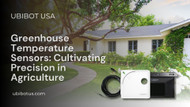Data Loggers; how do they function?
Posted by UBiBot USA on Mar 28th 2023
As you must already know, data loggers are devices that record and monitor the circumstances and conditions an asset is exposed to during a specific time. Now, a data logger can be a single unit, or it can also consist of multiple units. Usually, the single units are powered by batteries, while DC powers the various units. This allows the data loggers to record and transit at the same time.
The data loggers are like alert notification systems because the information and stored data can be transferred to the computer for analysis. They can monitor humidity, various temperatures, single and multiple power usage, voltage, counts, pulses, CO2, mV, and mA.
How do they work?
Especially data logger comes with a mini processor, along with internal memory for data storage and sensory that helps collect the data. The device itself is usually small and is operated by a battery. They can line up with computers and use software to analyze or use the collected data. But they can also use a local interface and connect wirelessly to devices.
Especially data loggers are unique because they don’t need a computer or any other device to operate; instead, they can function independently.
They are available in many shapes, sizes, and ranges (including simple, economic ones, or more powerful ones that can handle hundreds of data inputs), so you can take your pick according to your requirement.
Uses of data loggers:
The uses of data loggers are immense. All you need is a keen eye and a need for them to use them. They regularly monitor temperature-sensitive areas and areas with high-value assets (like museums), but these uses also have a wide variety. Let’s take a look at a few uses of data loggers.
- Monitoring of perishable foods
- Monitoring pharmaceutical consignments
- Monitoring the transit of goods from one place to another ensures they remain and reach their destination in perfect condition.
- Monitoring fine arts and museums
- Monitoring vehicle fleet and storage facilities
- Monitoring temperature-controlled assets.
- Monitoring the supply chain (because the components move through multiple hands)
Since data loggers can be used in temperature-sensitive places and for high-value items, they can be used in various areas, almost every industry could use them. From supply chains to food industries and automobiles to fine arts, they are ideal for every place and every business.
Types of data logger inputs
Data loggers are built so that they accept various kinds of inputs. Some loggers can even accept two or more types of inputs. For example, a data input could accept temperature and humidity or pressure and humidity.
There are even more advanced types of data loggers that can accept all kinds of data inputs. But what are all sorts of inputs? Let’s look at the list.
- Pressure: this input measures the pressure of liquids and gasses. This includes water and atmospheric pressures.
- Humidity: this input measures the humidity levels of a place; it includes dew points, water vapors, and even vapor concentration in metric or standard units.
- Temperature: this input measures the wavering temperatures of a place, from extremely high to low temperatures. This also includes the liquid temperatures.
- Current: this input measures the range of DC and AC data that is often needed to monitor a building or other types of electronic equipment.
- Voltage: this input measures the voltages. Including the pressure to torque and load to force of a machine.
Benefits of using a data logger
Data logging needs to be done under continuous human observation, they make life easier by recording various types of data, but they need humans to keep an eye on them. They are reliable, efficient, affordable, and the perfect monitoring solution that you can use for any measuring need.
But that’s not all to convince you about the benefits of data loggers, is it? Then let’s talk about some of their shiny benefits.
- High accuracy and efficiency: data logger can take observations and measurements automatically and precisely without human error and with perfect accuracy. This will also help save money.
- Acquiring versatile data: the data loggers can create a data logging system that meets the requirement of the application. It doesn’t matter if you monitor indoors, outdoors, or in any other area; data loggers are ideal for all situations.
- Alarms: they have LED alarms that can alert the user when readings fall or reach a specific range. This is ideal in tightly controlled areas.
- Easy analysis: getting data from the logger to your PC is similar to connecting wires to your PC (so easy!); all data automatically transfers to your computer.

